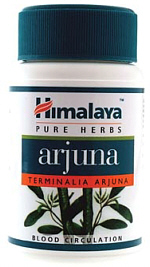Note: This is a project under development. The articles on this wiki are just being initiated and broadly incomplete. You can Help creating new pages.
Arjuna - Himalaya
- Botanical Name:(Terminalia Arjuna)
- Common Names:Arjuna, Arjun Herb, Arjun Root
- Benefits of Arjuna: Healthy Heart, Blood Circulation, Blood Pressure
Arjun herb has been used in Ayurveda since 2500 BC as a cardiac tonic. Various medical experts raved about Arjuna in the Health Sciences Institute newsletter "Once in a blue moon, we uncover a supplement that does so many things well, it is hard even for us to believe it is real." It also mentions many clinical studies conducted on Arjuna which have confirmed its numerous therapeutic cardiac benefits.
Arjuna's principle constituents are beta-sitosterol, ellagic acid and arjunic acid. Arjuna herb helps to maintain healthy cardiovascular functions and also promotes normal cholesterol levels. Arjuna bark powder contains the co-enzyme Q-10 that is extremely beneficial for strong heart muscles
Contents
[hide]Benefits of Arjuna / Arjun
- Arjuna herb works as a heart tonic that helps maintain heart health
- Arjun helps to maintain normal blood pressure
- Arjuna promotes proper blood flow and normal homocysteine levels.
- Heart muscles are strengthened by arjun
- Arjuna supports the blood's absorption of lipids indicating it has cholesterol-regulating properties
- Arjuna herb helps to reduces the effects of stress and nervousness on the heart.
- COQ10 in Arjuna supports the heart's energy output, and enhances overall energy levels, stamina, immunity, and cellular health.
Directions for taking Himalaya Arjuna
1 or 2 capsules twice daily with meals. Allow several weeks for long lasting benefits. Natural products treat not just the symptoms but the body as a whole and take time for absorption and results.
Arjuna in Ayurveda:
Arjuna has been described as an important cardiotonic herb in Ayurveda. In Ayurveda, ischemic heart disease (IHD) is known as Hridroga. There are five clinical descriptions of IHD according to Ayurveda based on vitiated doshas and other causes. If the pain is acute and has a shifting nature, it is known as vata heart disease. If it is associated with a burning sensation, it is called pitta heart disease. If the pain is mild and is associated with heaviness, nausea, and cough, it is called kapha heart disease. If all the representative symptoms are present, then it is identified as tridosha heart disease. In Ayurveda, kapha (hardening of arteries) is the major underlying mechanism of heart diseases. Various herbs are used in the Ayurvedic system of medicine for their heart protective actions. These are Arjun (Terminalia arjuna), Ashwagandha (Withania somnifera), Lasuna (Allium sativum) and Turmeric (Curcuma longa).
Arjuna herb Research and Clinical Studies
Arjuna herb contains specific medically active constituents namely triterpine glycosides like arjunetosides I, II, III, IV, arjunine and arjunetein. The bark is rich in saponnins, natural anti-oxidants (flavonoids-arjunone,arjunolone,leteilin) gallic acid, ellagic acid, oligomeric proanthocyanidins, phytosterols, rich in minerals like calcium, magnesium,zinc and copper.
Arjuna herb has been subjected to various research which indicate that COQ10 and arjunoids present in Arjuna herb help in protecting the heart and strengthening heart muscles. It is also beneficial for maintaining normal blood circulation, blood pressure and cholesterol levels.
